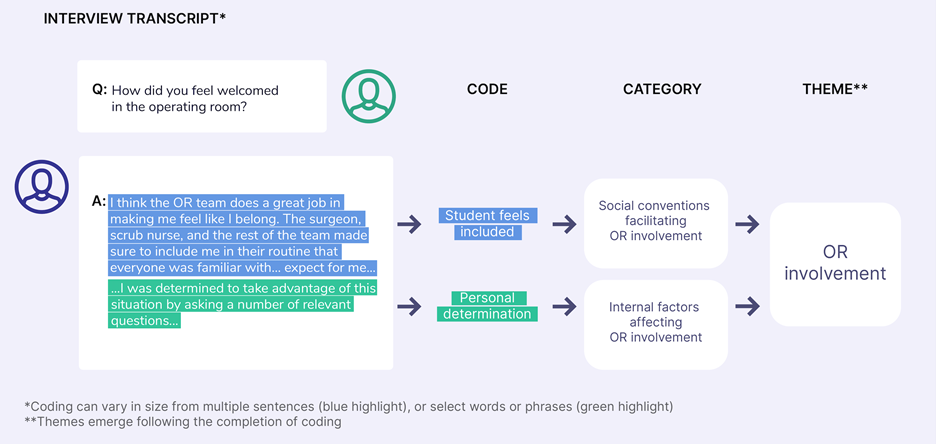Background
The Core Surgery Clerkship represents one of the first opportunities for medical students to explore general surgery and its surgical subspecialties. A recent study of Harvard medical students’ perceptions of surgery showed that identity has a significant effect on medical specialty selection for students with racial identities, gender identities, or sexual orientations that are underrepresented in medicine. Specifically, when Lesbian, Gay, Bisexual, Transgender, Queer, and any sexually and gender diverse (LGBTQ+) medical students were asked if their gender identity or sexual orientation will have an impact on their future specialty selection, 81% of LGBTQ+ students agreed with this statement, compared to 53% of cisgender straight medical students (p=0.02).1 According to the most recent data from the Association of American Medical Colleges Graduation Questionnaire, 11.6% of graduating medical students in 2022 identified as a sexual minority (lesbian, gay, bisexual, pansexual, etc.), and 1.1% of all medical graduates identified as having a gender identity that differed from societal expectations related to the sex they were assigned at birth (i.e., transgender or gender diverse).2 There remains a lack of research about the specific challenges that LGBTQ+ medical students may face in surgical specialties, with most published studies focused on the experiences of LGBTQ+ general surgery resident physicians.
In general, LGBTQ+ surgical resident physicians are significantly more likely to experience mistreatment and discrimination based on gender identity and sexual orientation compared to non-LGBTQ+ surgical residents.3 The most common forms of this discrimination reported by LGBTQ+ surgical trainees were being mistaken as a non-physician, being subjected to slurs or negative comments, sexual harassment, and different standards of evaluation compared to their non-LGBTQ+ peers. The most common discriminatory behaviors reported were crude comments, offensive body language, and unwanted verbal sexual attention. The sources of these behaviors included patients and their families, co-residents, and attending surgeons. A 2014 survey of general surgery resident physicians noted that over half of LGBTQ+ resident physicians reported concealing their LGBTQ+ identities from fellow resident physicians and attending surgeons out of fear of rejection or poor evaluations.4,5 These issues have important consequences, as despite there being no significant difference between LGBTQ+ and non-LGBTQ+ general surgery resident physicians’ satisfaction with their decision to become a surgeon, LGBTQ+ general surgery residents were almost twice as likely to consider dropping out of their residency program than their non-LGBTQ+ counterparts.3
Given the real challenges that LGBTQ+ general surgery resident physicians face during their training, and the importance of LGBTQ+ visibility for medical students’ differentiation into specialties within medicine, there is a critical need to enhance LGBTQ+ visibility and equity at the national, departmental, and interpersonal levels within the Core Surgery Clerkship.
National-level Recommendations
At the national level, the Association of Out Surgeons and Allies (AOSA) is an invaluable resource for LGBTQ+ surgical trainees and surgery program or clerkship directors.6 This relatively new organization promotes LGBTQ+ inclusivity and equity by furthering learner engagement, supporting trainees’ professional development, and creating a community space for LGBTQ+ surgeons. AOSA focuses its efforts on outreach and education by connecting surgical trainees with mentor surgeons and providing resources for understanding LGBTQ+ professional and healthcare disparities. This organization also promotes visibility for LGBTQ+ surgeons by collaborating with other surgical associations to develop programming and policies that are inclusive of LGBTQ+ people, offering scholarships and educational opportunities for trainees, and working with other affinity surgical societies to support LGBTQ+ surgeons with intersectional identities.6 Membership to this organization is free for medical students and is an excellent resource for Core Surgery Clerkship directors to offer for medical students on the wards at the start of the rotation.
Additional national-level resources for medical students that are not specific to surgery but nevertheless beneficial for all LGBTQ+ medical students include the American Medical Association’s Advisory Committee on LBGTQ+ Issues, and GLMA: Health Professionals Advancing LGBTQ+ Equality. Both organizations provide opportunities for medical students to engage in LGBTQ+ mentorship, advocacy, and research. There has been a historical sparsity of national resources for LGBTQ+ medical students, however these organizations and AOSA are making significant steps forward for LGBTQ+ visibility and equity.
Strengthening the presence of longitudinal LGBTQ+ curricular themes in the Core Surgery Clerkship represents another area for improvement of LGBTQ+ inclusivity and visibility. Recently, the Sexual and Gender Minority Health Equity Initiative at Harvard Medical School devoted over four years to designing and implementing an LGBTQ+ longitudinal theme in the medical curriculum.7 This initiative created nine core competencies representing essential skills that all medical students should demonstrate by the completion of their medical degree. A number of these core competencies can serve directly as competencies for the Core Surgery Clerkship as they relate to caring for LGBTQ+ patients and families on surgical services. These core competencies include considering how unconscious bias impacts clinical outcomes, developing rapports with LGBTQ+ patients and family members, and conducting both a sensitive and effective sexual history and a trauma-informed physical exam with LGBTQ+ patients.7
Department-level Recommendations
At the departmental level, there are number of practices that clerkship directors should consider to improve LGBTQ+ equity on the Core Surgery Clerkship. A recent publication noted that surgical resident physicians who completed an LGBTQ+ training module had improvement in their self-assessment of knowledge, skills, openness, and support for LGBTQ+ health, with a strong majority of surgical residents stating that participation in this program was relevant to surgical care (71%) and resulted in improvement in their cultural competency in LGBTQ+ patient care (86%).8 Longitudinal efforts to improve LGBTQ+ cultural responsiveness training for attendings, surgical residents, scrub technicians, circulators, and floor nursing staff could result in improved experiences for LGBTQ+ medical students on their surgery clerkship.
In addition, at the start of the rotation, we also recommend that clerkship directors provide resources specific to their department that can improve feelings of belonging and psychological safety for LGBTQ+ medial students. Specifically, these resources could include an “OutList” of surgeons and residents within the department who are publicly out as LGBTQ+ and open to establishing mentorship relationships. Other resources such as a listing and map of gender-inclusive restrooms, locker rooms, and call rooms, and avenues to clear protocols for reporting mistreatment when this occurs during the rotation, are also important. Finally, clerkship directors can support coordinating and publicizing LGBTQ+ surgery panel discussions and research opportunities.
Interpersonal-level Recommendations
At the interpersonal level, Core Surgery Clerkship directors can also support a formalized mentorship program for LGBTQ+ medical students in which students are paired with fellow LGBTQ+ residents and attendings. Additionally, course directors can work with senior medical students who are interested in surgery and have LGBTQ+ identities to volunteer as near-peer mentors for junior medical students on the wards. Surgical departments can also invest in pronoun badges and pride flag lanyards to share with their department members and surgical trainees, as a statement of solidarity for LGBTQ+ patients, family members, and colleagues.
Summary of Learning Points
LGBTQ+ medical students on the surgical clerkship and surgical trainees unfortunately face higher levels of discrimination on the basis of gender identity and sexual orientation than their cisgender straight peers, as well as reporting more frequent instances of sexual harassment. As the Core Surgery Clerkship represents the first major experience within general surgery and surgical subspecialties, a coordinated, multilevel set of recommendations to Core Surgery Clerkship directors can help enhance LGBTQ+ inclusivity and equity. Recommendations at the national level include connecting students with the Association of Out Surgeons and Allies and establishing core competencies for LGBTQ+ surgical care as part of a longitudinal curricular theme. Department recommendations include requiring LGBTQ+ cultural responsiveness training, providing students with hospital-specific resources for LGBTQ+ faculty and resident mentorship, and access to gender-inclusive call rooms, restrooms, and locker rooms. Finally interpersonal recommendations to show support and solidarity include wearing pronoun badges and pride flag lanyards for hospital IDs, as well as providing near-peer mentorship through LGBTQ+ senior medical students who are interested in surgery. More research is needed to study the impact of these recommendations on enhancing LGBTQ+ inclusivity and equity during the surgery clerkship specifically, as well as in the field of surgery overall.


